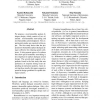232 search results - page 7 / 47 » Learning User Intentions in Spoken Dialogue Systems |
ACL
2001
15 years 3 months ago
2001
This paper focuses on the analysis and prediction of so-called aware sites, defined as turns where a user of a spoken dialogue system first becomes aware that the system has made ...
SIGDIAL
2010
14 years 11 months ago
2010
We propose a non-humanlike spoken dialogue design, which consists of two elements: non-humanlike turn-taking and non-humanlike acknowledgment. Two experimental studies are reporte...
112
click to vote
AIED
2009
Springer
15 years 8 months ago
2009
Springer
This study shows that affect-adaptive computer tutoring can significantly improve performance on learning efficiency and user satisfaction. We compare two different student uncer...
123
click to vote
LREC
2010
15 years 3 months ago
2010
We present Witchcraft, an open-source framework for the evaluation of prediction models for spoken dialogue systems based on interaction logs and audio recordings. The use of Witc...
104
click to vote
UM
2009
Springer
15 years 8 months ago
2009
Springer
Abstract. User behaviors on a system vary not only among individuals but also within the same user when he/she gains experience on the system. We empirically investigated how indiv...

